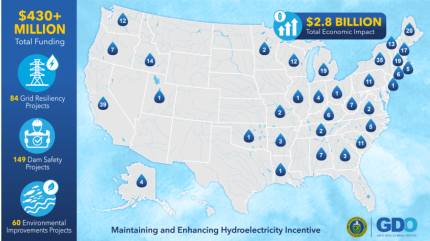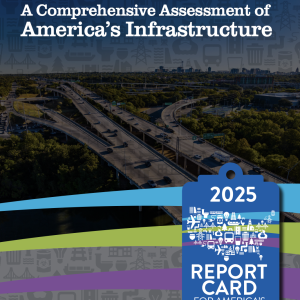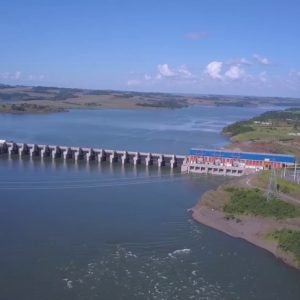
The Biden-Harris Administration announced it will invest $430 million in 293 hydroelectric improvement projects across 33 states. The funding, part of the Investing in America agenda, will enhance dam safety, improve grid resilience, and support environmental and recreational upgrades at aging hydropower facilities.
Administered by the Department of Energy’s (DOE) Grid Deployment Office and funded by the Bipartisan Infrastructure Law, the Maintaining and Enhancing Hydroelectricity Incentives program targets facilities with an average age of 79 years. The initiative aims to enhance dam safety, improve grid resilience at 215 facilities, and protect 6,000 existing jobs at hydropower facilities as well as contractors and vendors.
“Hydropower has reliably kept America running for almost 150 years—and the Biden-Harris Administration is ensuring these long-standing facilities can continue the steady flow of clean power,” said U.S. Secretary of Energy Jennifer M. Granholm. “Today’s funding will expand and modernize our hydropower fleet, while protecting thousands of American jobs.”
Hydropower currently contributes nearly 27% of U.S. renewable electricity generation and 93% of utility-scale energy storage, but many facilities require upgrades.
Key hydropower project upgrades
The Investing in America agenda focuses on capital improvements in three key areas of hydropower: enhancing grid resilience, boosting dam safety, and supporting environmental and recreational upgrades at hydropower facilities. Funded by the Bipartisan Infrastructure Law, the DOE’s Maintaining and Enhancing Hydroelectricity Incentives program is part of this effort and is complemented by two other initiatives: the Hydroelectric Production Incentives, which provide payments to qualified hydroelectric facilities for electricity generated and sold, and the Hydroelectric Efficiency Improvement Incentives, which offer payments to increase power generation from the existing hydropower fleet.
The 293 projects announced today will:
Strengthen grid resilience at hydropower dams by:
- Replacing or upgrading turbines and generators
- Upgrading control systems
- Upgrading cables and transformers
- Upgrading penstocks, which transport water to the turbines
Improve dam safety by upgrading aging dam infrastructure and strengthening existing infrastructure against extreme weather events. The average number of years selected facilities have been in operation is 79 years. Specific examples of projects include:
- Upgrades to emergency spillways, which channel extra water during heavy rains
- Concrete replacement to prevent water seepage through the dam
- Water conveyance repairs to improve how the dam controls water movement
- Upgrades to gates
- Upgrades to prevent overtopping of dam walls
- Erosion repair on the dam and surrounding areas
Facilitate environmental and recreational improvements to hydropower infrastructure that will improve water conditions and expand surrounding habitat and passage for fish and other species, and upgrade recreational facilities near dams. For example:
- Fish passage projects will install fish ladders or other equipment to enable fish and other aquatic species to pass through the dam and/or the turbine. Some projects will also improve or expand the wildlife habitat surrounding the dam.
- Water quality projects will deploy special turbines that reduce the loss of oxygen in water as it runs through the turbine to generate electricity. Water quality projects might also improve aquatic habitats downstream of the dam, as well as benefit species of conservation concern or cultural significance to Indian Tribes.
- Recreation projects will establish or maintain recreational facilities and opportunities near the dam, which might include expanding water access for boating; improving access for other recreational activities, such as kayaking and white-water rafting; and enhancing walking trails.
These investments align with the President’s Justice40 Initiative, which aims for 40% of certain federal benefits to reach disadvantaged communities impacted by pollution and underinvestment.
The full list of selections can be found online. In addition, the Grid Deployment Office will host a public webinar on the selections on September 11, 2024 from 1:00 to 1:30pm ET. Registration is required.
DOE anticipates releasing a second round for Maintaining and Enhancing Hydroelectric Incentives next calendar year.






